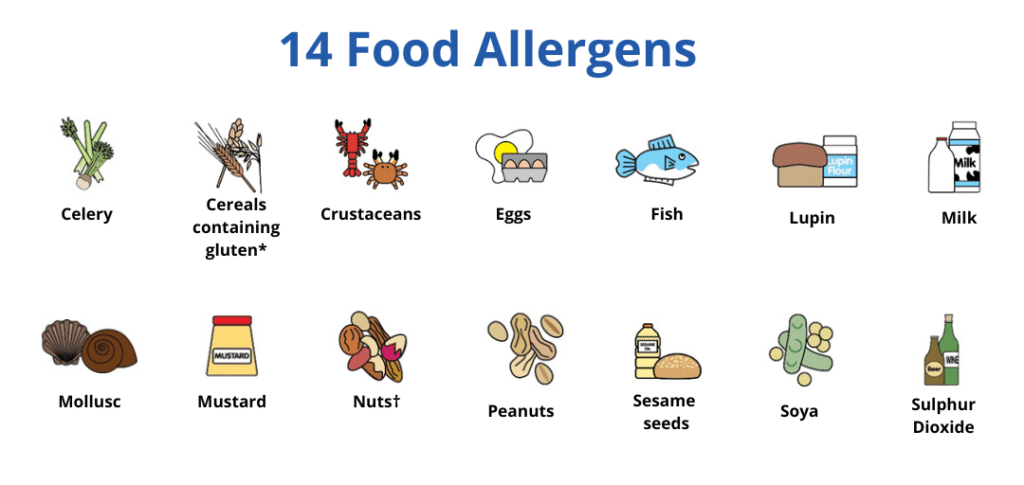Editorials
Allergens: The Silent, Invisible Killers
Natasha’s Law came into effect on 1st October 2021, but has it made a difference?
Though Natasha’s Law was passed in 2019; following the tragic death of 15-year-old Natasha Ednan-Laperouse in 2016, due to a severe allergic reaction to sesame seeds in a baguette, it did not come into effect until 1st October 2021, in order to give manufacturers and retailers an opportunity to comply with the labelling requirements.
Natasha had a known allergy to sesame seed and was very careful in her selection of food when eating out. She was delighted to have found her favourite ingredients, olives and artichokes, in what she believed to be an allergy-free sandwich in the Pret A Manger branch at Heathrow, whilst waiting for her flight to Nice. Within minutes of boarding her flight, Natasha suffered a severe anaphylactic reaction to the sesame baked into the bagette, nothing of which was mentioned in the allergen advice on the label, and sadly she died later that day.
 Photo Source: The Natasha Allergy Research Foundation
Photo Source: The Natasha Allergy Research Foundation
Another tragic example, which help to communicate the seriousness of the problem, was Celia Marsh, a 42 year old dental nurse from Melksham in Wiltshire, who suffered anaphylactic shock, following the consumption of a super-veg rainbow flatbread, bought at Pret a Manger in Bath. Having suffered allergies since childhood, she always triple-checked food but did not know that the flatbread contained traces of milk protein. Minutes after eating the wrap in December 2017, she collapsed and was pronounced dead at hospital. Pret a Manger had wrongly described the flatbread as ‘dairy free’.

A Prison Sentence
A further tragic case is that of 15 year old Megan Lee, who died after suffering a severe allergic reaction to nuts contained in a takeaway meal. Megan had suffered from allergies all her life and was consequently very careful about the food she ate. Vulnerable as she was however, she had never been referred by her GP to a food allergy consultant, nor issued with an Epipen or similar. She stayed away with a friend in December 2016 and ordered a take away meal from Royal Spice in Oswaldtwistle, Lancashire. Megan made clear her allergies to prawn and nuts on a note delivered by her friend at the time of ordering. After consuming the meal, Megan ended up in hospital where she died 2 days later with irreversible brain damage.

In court, Harun Rashid and Mohamed Abdul Kuddu, both of Royal Spice, denied causing Megan’s death. They were both given custodial sentences for manslaughter, but Kuddu’s conviction was overturned on appeal.
Adam Lee subsequently met with Kevin Hollinrake MP and Sushma Acharya of the Food Standards Agency and stressed his desire to see Allergy training and certification to be made mandatory for fast food outlet personnel to be mandatory. It seems that both Kuddu and Rashid were totally ignorant about food allergies and, at Royal Spice, there were no food allergen procedures in place to protect the public.
High Levels of Ignorance
Since doing the research for this article I have been surprised at the small number of fast food outlets that display even a food allergen poster. I was at a very large garden centre this Saturday and surprised to see that, in there very well appointed restaurant, there were no allergen warning signs or charts showing the 14 allergen groups and nothing on the menu. Yet this restaurant very prominently displayed, in several places, the Hygiene poster showing that they had achieved the highest grade 5. I was surprised though to see that there was no date showing when they gained this enviable status and no expiry date. Even if there was, nothing exists within the hygiene rating inspections regarding allergen awareness or control.
I believe that Adam Lee is 100% correct in that allergen awareness and control must have its own mandatory training course and certification, dated and valid for a limited period, with regular inspections. This must apply to all fast-food outlets and restaurants.
Ten Deaths per Year
There are only about ten deaths in the UK from food allergies each year, but even one death is one too many. The effect of allergic reactions is much wider. The rate of hospital admissions in the UK and globally, due to a serious allergic reaction caused by food, has more than tripled over a twenty-year period. Despite this, the death rate from food induced anaphylaxis halved during the same period. (Ref. Research by The BMJ Today).
So, it seems an obvious conclusion that food related allergies are on the increase, possibly due to the increase in food varieties during the last few decades, and other factors. For example, there have been some reported allergic reactions to kiwi fruits, a food which does not feature amongst the 14 known allergen groups.

Around two million people in the UK are thought to live with food allergies. There has also been a four-fold increase in prescriptions for adrenalin auto-injectors, such as Epipen, during the last 20 years. It’s estimated that up to 10% of adults and children have a food sensitivity with as much as 20% of the population experiencing some reaction to food which suggests they do have a food hyper-sensitivity. On average 2 school children per class in the UK have a food allergy.
A Huge Global Problem
Across Europe up to 26 million people are estimated to suffer from ‘food’ allergies. If this is projected onto a world population of 7 billion, then there are up to 550 million potential food allergic people, a massive global health problem. Young children are of the greatest concern, where the incidence of food allergy (often life-threatening) is estimated to be up to 8%.
Adding further grist to the mill and thereby highlighting the seriousness of the problem, between 2021 and 2022, throughout England and Wales, Trading Standards identified more than 7,000 businesses supplying food which was mis-described, did not declare allergens or contained toxins. (Ref: Trading Standards Review, 2022 Winter edition)
Even more worrying is that, though Natasha’s Law has been in place now for more than 12 months, a little over 37% of Britains agree that it’s easy to identify which allergens a product is free from by its label. Research has also found that nearly half (48%) of Britains are unsure whether or not allergen labels are clear and a further 15% have no confidence in them at all. (Ref: Mintel)
Totally Avoidable
It is clear from the above that there is a far wider spectrum of suffering caused by allergies than the 10 deaths per year. Fortunately, addressing the issue of fatalities consistently will also reduce the extent of suffering for those with less serious allergic reactions.
As a consumer, I am not aware that much has changed since the introduction of Natasha’s Law. Manufacturers of pre-packaged products appear to rely too heavily upon the allergies emboldened on the printed packaging and fast-food outlets of pre-packaged products for direct sale (PPDS) appear to have made few changes at all, other than a small poster here and there.
What if Incorrect Packaging is Used?
What if the product pre-packers, who’s products have allergens emboldened on their packaging, use the wrong packaging on a different product, a product which contains allergens that are not noted on that label?
During a recent survey of the 14 UK supermarket chains, only 3 were seen to reduce their incidence of incorrect labelling, where the other 11 had shown either no improvements or a worsening situation. Supermarket pre-packers should, and usually do, take responsibility for this.

Fortunately, problems caused by inaccurate labelling for pre-packers are easy to solve with modest investment. It will come as no surprise to many to learn that this is one of Harford Control’s specialities.
Share your packaging control problems with us and we will help eliminate your future risks permanently.
Roy Green, MD, Harford Control Ltd.
April 2023
Share your thoughts to Info@harfordcontrol.com or give us a call on +44 (0) 1225 764461




